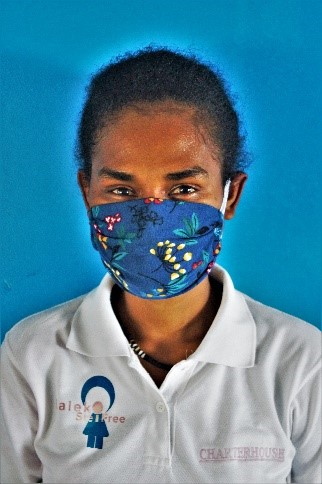Claire’s passion signs out amidst pandemic
BY MAVIS NISHIMURA PODOKOLO
AMIDST the negative impacts of the covid-19 pandemic, Claire
has shown resilience through her hard work and enthusiasm to help combat the
virus.
Claire is deaf and unable to speak and only communicates
through sign language and writing.
 |
| Claire showcasing an early prototype mask.Photo By Kaleko Steifree Solomons |
The quality of her sewing skills has brought the attention
of Kaleko Steifree Solomons who believed in her and provided her with the
necessary training and supervision.
With this support, Claire was able to brand her own product,
“the Claire clothe facemask”.
These masks are now being sold in Solomon Islands to support
COVID-19 prevention.
To date, Claire and 10 other women have been empowered to
diversify their marketing, design and production skills, and were able to
maintain regular employment throughout the continued difficult economic impacts
of COVID 19 restrictions and have managed to sold out 3,000 masks.
“My confidence has
really improved, as when I started this work, I only knew how to sew the pads,”
she said.
“I had to do a lot of trials of the design for the face
masks, doing the cutting and testing of the fabrics, checking if the material
for the facemasks were breathable and suitable for the climate in the Solomon
Islands,” Claire added.
During COVID-19, “I am very thankful that I have been able
to keep my job, while everyone around me had their working shifts cut. So, I am
a main contributor to my family and meeting our living costs.”
According to Kaleko Steifree Solomons, Claire is a proud and
confident young woman who has difficulty hearing and speaking.
It was Claire who took the lead in the technical design and
production of the reusable facemasks.
The marginalized group that benefited from this change are
the women, including women living with disabilities.
Many of the women employed by Kaleko Steifree Solomons are
the main income-earners in their family, said Kaleko Steifree Solomons.
Mary Ramosaea, the director of Kaleko Steifree Solomons said
Claire is a product of the small but vibrant pathway for children with
disabilities in Solomon Islands.
Claire’s sewing skills are very precise, so she has been
made an instructor for the other staff and has oversight of the quality
assessment of the finished products.
 |
| Claire and colleagues discussing Face Mask designs during protyping.Photo By Kaleko Steifree Solomons |
Ramosaea said when Claire joined Kaleko Steifree Solomons
she found making the reusable pads really hard work.
Because she can’t hear and talk, she found it difficult to
ask questions from workmates.
At first, she could only communicate with them by writing on
paper and so she decided to bring in a sign language translator, which enabled
Claire to communicate more easily, and also had the result of the rest of the
women sewing at Kaleko Steifree Solomons learn the basics of sign language.
“So now Claire can communicate much more easily, and the
knowledge of sign language is spread into more families in Honiara.”
She said due to COVID -19 shutdowns, employment in the
Solomon Islands was affected and for some marginalized groups, finding regular
employment became more difficult.
“For the past seven years Kaleko Steifree Solomons has
operated as a social enterprise that employs women to make reusable
menstruation pads under the brand, Kaleko Steifree Solomons.”
As part of COVID-19 prevention and response, the New Times
New Targets Project through the Water for Women Fund, approached Kaleko
Steifree Solomons and suggested that they should consider designing and sewing
reusable facemasks.
Ramosaea said they are committed to giving opportunities for
disadvantaged girls, and deliberately sought out vulnerable women to work in
the social enterprise.
“I have this great passion for people with disability and
they are one of the most vulnerable people in Solomon Islands, so I want to
find ways to engage them in employment. Claire was able to sew, so this enabled
me to give her the skills and opportunity to be used, and to help Claire reduce
her vulnerability,” she said.
Ramosaea said Claire and all other women employees were able
to maintain their employment during COVID-19 restrictions.
They were able to
continue to provide for their own families and continue to meet the financial
demands of school fees and other household costs.
 |
| Face Mask brand and packaging developed by the Project and used by MJ Enterprise.Photo By Kaleko Steifree Solomons |
Claire herself expressed pride and happiness in having a
product on the market that features her face and story because public promotion
that shows the contribution of women living with a disability is very rare in
Solomon Islands.
Claire attended Red Cross special primary school, and then
did further education at the San Isidro vocational school where she learned
home economics and sewing.
Claire spent two years at San Isidro school, and then
completed an internship with the South Pacific Community (SPC).


Comments
Post a Comment